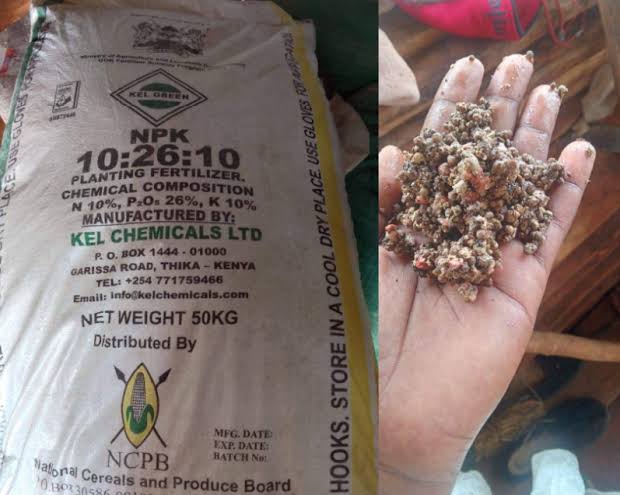Thousands upon thousands of Kenyan farms could be in big trouble. They could be experiencing a silent scourge. When the very tools meant to nurture our lands turn harmful, the echoes of betrayal resonate far and wide across the fields and futures of our farmers. The issue of fake, inauthentic fertilizers is a national emergency that deserves speedy decisive action.Anything less would be a betrayal to farmers and Kenyans as a whole.
The sanctity of fertilizer quality, defined by stringent standards, underscores its criticality to agriculture. Yet, deviations from these standards—often dismissed under the veil of semantics—are nothing short of a grave assault on consumer trust and agricultural integrity. With the current government’s ascension on promises of revitalizing agriculture, the rampant distribution of substandard fertilizers not only undermines these vows but also jeopardizes the very foundation of our food security.
The stakes are alarmingly high, as the repercussions of this deceit extend beyond mere economic loss.
First, consider the peril to our food security and agricultural productivity. Our neighbors in Zimbabwe, Mozambique, Botswana, and Namibia, who once stood as our fallback during past agricultural trials, now grapple with their own crop failures due to erratic weather patterns. The specter of failing crops exacerbated by counterfeit fertilizers presents a dire scenario—where would we turn if our own yields falter under the weight of this deceit?
Secondly, the integrity of our soil is at risk. A comprehensive soil survey conducted in 2017 revealed a mismatch between the fertilizers farmers use and what their lands genuinely need. The persistent use of unsuitable or fake products could lead to irreversible soil degradation, turning fertile lands barren and dreams into dust. Imagine the plight of a farmer witnessing decades of soil nurturing undone by one season of fraudulent fertilizer.
Thirdly, the economic impact on our farmers is profound and far-reaching. Farmers invest their scarce resources in what they believe will ensure bountiful yields, only to find themselves duped, their hopes dashed by the very inputs they trusted. The financial strain is compounded by the emotional toll, as they grapple with the realization that their hard-earned money and invaluable time have been squandered.
This calamity calls not for mere reflection but for resolute action—accountability must be the cornerstone of our response. It is imperative that the relevant authorities intensify their scrutiny and oversight, ensuring that every granule of fertilizer holds the promise of growth, not grief. We need stringent enforcement of standards, rigorous testing, and a transparent supply chain to safeguard the interests of every Kenyan farmer.
Moreover, educating our farmers about the importance of certified fertilizers and how to distinguish them from counterfeit products is crucial. This knowledge empowers them to make informed decisions, protecting their investments and livelihoods from the predatory practices of unscrupulous vendors.
As a nation, we stand at a crossroads, where the path we choose could determine the fate of our agricultural heritage and food sovereignty. The issue of fake fertilizers is a stark reminder of the vulnerabilities within our agricultural sector, vulnerabilities that must be addressed with urgency, transparency, and an unwavering commitment to the farmers who feed our nation.
Let this be a clarion call to all stakeholders—from policymakers to the custodians of our land—to rally against this injustice with unwavering vigilance. We must also identify and seal the cracks through which the fake fertilizer fell through into society. That will require a combination of legislative, judicial and executive action! Let me conclude by reminding Kenyans that last December, four Japanese Ministers and five Deputy Ministers resigned after accusations of misusing the ruling Party’s funds emerged. That’s accountability. That’s what Kenya needs. For the Public to hold leaders accountable and for these leaders to take responsibility for the good and bad. Tuajibike. Think green, act green!



